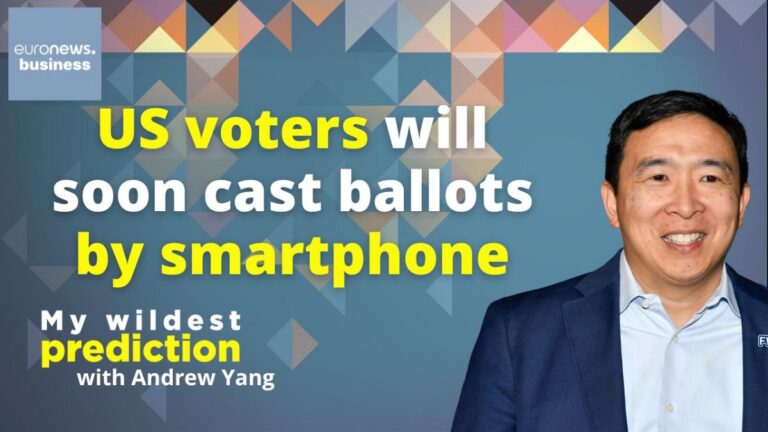It’s undeniable, mobile phones have become essential items in our lives.
We use them for everything: communicating with other people, showing off our best pictures, booking gym classes, managing our finances, and even paying for our groceries.
Yet, there is one thing most people still don’t use their smartphones for: voting in elections.
Since Estonia became the first country in the world to introduce internet voting in local government council elections in 2005, this use of technology has been a topic of debate in the political arena.
Some experts fear it could undermine democratic standards by threatening voter privacy and compromising the integrity of elections due to potential interceptions and security vulnerabilities.
Others opt for a more positive stance, arguing that online voting could increase voter turnout, strengthening democratic systems.
United States entrepreneur Andrew Yang is part of the latter group. He joined My Wildest Prediction to explain why, according to him, smartphone voting could revolutionise American politics.
Yang is an entrepreneur, a former US presidential candidate with the Democratic Party, and the founding co-chair of the Forward Party.
My Wildest Prediction is a podcast series from Euronews Businesswhere we dare to imagine the future with business and tech visionaries. In this episode, Tom Goodwin talks to Andrew Yang, a US businessman and former presidential candidate.
What is mobile voting?
“My wildest prediction is that Americans will be voting on their smartphones in the next eight years,” Andrew Yang told Euronews Business.
In describing how this process could work, Yang cited the US organisation Mobile Voting, a nonprofit, nonpartisan initiative working to make smartphone voting a reality.
Looking at Mobile Voting’s trials, Yang explained that voting by smartphone would not be mandatory, but one option of a hybrid system, allowing people to choose whether to vote digitally or in person.
He also noted that the digital ballots would have a paper backup once received by the election offices, adding a layer of verification.
According to Yang, mobile voting could profoundly change the US political system.
“Smartphones have been a net negative in terms of the functioning of democracy in America and most countries; it’s about time they did something good,” he said.
For this reason, Yang believes that resistance to online voting stems less from security concerns and more from a fear of disrupting the existing two-party status quo in the US.
Mobile voting, a way to change US politics?
Yang is convinced that mobile voting could make voting more accessible, boost voter turnout and reduce US polarisation.
According to him, greater participation would especially impact the US primaries, which have historically been characterised by very low participation. In 2022 primaries, for instance, the turnout of all eligible voters was 21.3%, meaning that the presidential candidates were chosen by a minority.
Thanks to a greater participation through mobile voting, Andrew Yang thinks US politics could move away from the biparty system and take into consideration a broader range of opinions.
“That’s why we have to improve accessibility, so that you can expand the franchise,” Yang told Euronews Business.
He argued that mobile voting could have influenced the outcome of recent US elections: “It would have changed the type of candidates that were getting through the primaries, if you had a more representative electorate.”
Yang thinks that a shift in politics can be helpful in tackling major problems.
According to the businessman, US politics needs a structural change to address some important economic questions.
“We’re looking for a hero or a villain to save us, a person to change everything, but what’s required is changing the underlying system,” he told Euronews Business.
Looking ahead, Yang is pessimistic about the trajectory of the US economy. He fears that without bigger political participation, socio-economic inequalities in the country will only continue to deepen.


